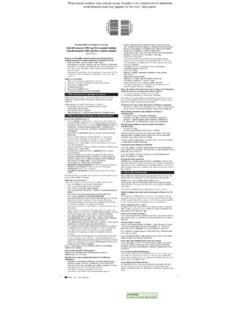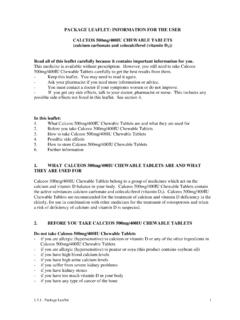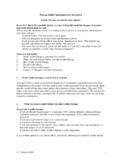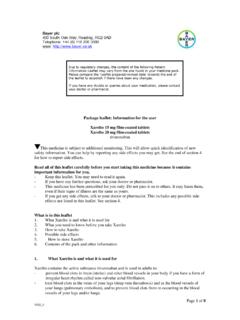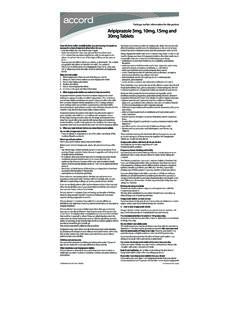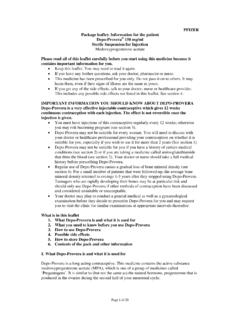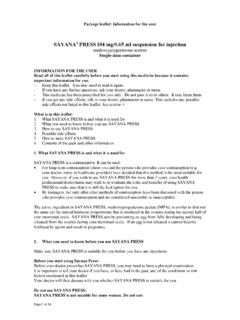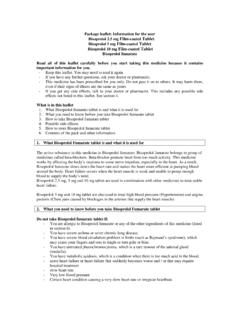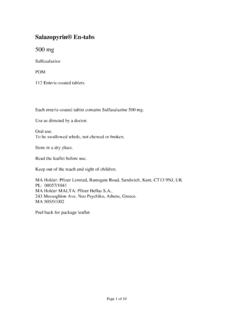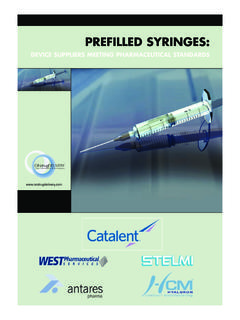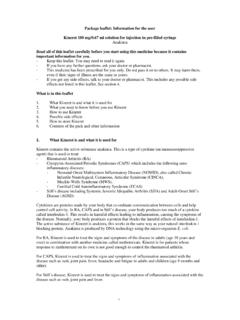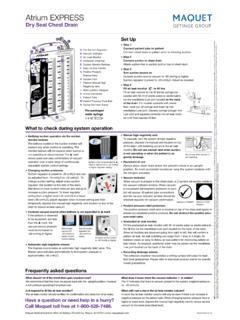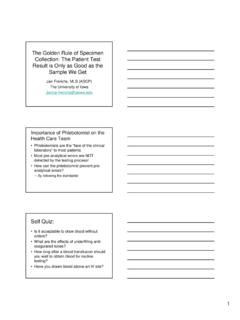Transcription of Package leaflet: Information for the user Cimzia 200 mg ...
1 Package leaflet: Information for the user Cimzia 200 mg solution for injection in pre- filled syringe certolizumab pegol Read all of this leaflet carefully before you start using this medicine because it contains important Information for you. - Keep this leaflet. You may need to read it again. - If you have any further questions, please ask your doctor, pharmacist or nurse. - This medicine has been prescribed for you only. Do not pass it on to others. It may harm them, even if their signs of illness are the same as yours. - If you get any side effects talk to your doctor, pharmacist or nurse. This includes any possible side effects not listed in this leaflet. See section 4. What is in this leaflet 1. What Cimzia is and what it is used for 2. What you need to know before you use Cimzia 3. How to use Cimzia 4. Possible side effects 5. How to store Cimzia 6. Contents of the pack and other Information Your physician will also give you a Patient Alert Card, which contains important safety Information of which you need to be aware before you are given Cimzia and during treatment with Cimzia .
2 Keep this Patient Alert Card with you. 1. What Cimzia is and what it is used for Cimzia contains the active substance certolizumab pegol, a human antibody fragment. Antibodies are proteins that specifically recognise and bind to other proteins. Cimzia binds to a specific protein called tumour necrosis factor (TNF ). Thereby this TNF is blocked by Cimzia and this decreases inflammation diseases such as in rheumatoid arthritis, axial spondyloarthritis, psoriatic arthritis and psoriasis. Medicines that bind to TNF are also called TNF blockers. Cimzia is used in adults for the following inflammatory diseases: rheumatoid arthritis, axial spondyloarthritis (including ankylosing spondylitis and axial spondyloarthritis without radiographic evidence of ankylosing spondylitis), psoriatic arthritis plaque psoriasis Rheumatoid arthritis Cimzia is used to treat rheumatoid arthritis. Rheumatoid arthritis is an inflammatory disease of the joints.
3 If you have moderate to severe active rheumatoid arthritis, you may first be given other medicines usually methotrexate. If you do not respond well enough to these medicines, you will be given Cimzia in combination with methotrexate to treat your rheumatoid arthritis. If your doctor determines that methotrexate is inappropriate, Cimzia can be given alone. Cimzia in combination with methotrexate can also be used to treat severe, active and progressive rheumatoid arthritis without previous use of methotrexate or other medicines. Cimzia , which you will take in combination with methotrexate , is used to: reduce the signs and symptoms of your disease, slow down the damage to the cartilage and bone of the joints caused by the disease, improve your physical function and performance of daily tasks. Ankylosing spondylitis and axial spondyloarthritis without radiographic evidence of ankylosing spondylitis Cimzia is used to treat severe active ankylosing spondylitis and axial spondyloarthritis without radiographic evidence of ankylosing spondylitis (sometimes referred to as non-radiographic axial spondyloarthritis).
4 These diseases are inflammatory diseases of the spine. If you have ankylosing spondylitis or non-radiographic axial spondyloarthritis you will first be given other medicines. If you do not respond well enough to these medicines, you will be given Cimzia to: reduce the signs and symptoms of your disease, improve your physical function and performance of daily tasks. Psoriatic arthritis Cimzia is used to treat active psoriatic arthritis. Psoriatic arthritis is an inflammatory disease of the joints, usually accompanied by psoriasis. If you have active psoriatic arthritis you will first be given other medicines, usually methotrexate. If you do not respond well enough to these medicines, you will be given Cimzia in combination with methotrexate to: reduce the signs and symptoms of your disease, improve your physical function and performance of daily tasks. If your doctor determines that methotrexate is inappropriate, Cimzia can be given alone.
5 Plaque psoriasis Cimzia is used to treat moderate to severe plaque psoriasis. Plaque psoriasis is an inflammatory disease of the skin, and can also affect your scalp and nails. Cimzia is used to reduce skin inflammation and other signs and symptoms of your disease. 2. What you need to know before you use Cimzia Do NOT use Cimzia - If you are ALLERGIC (hypersensitive) to certolizumab pegol or any of the other ingredients of this medicine (listed in section 6) - If you have a severe infection, including active TUBERCULOSIS (TB). - If you have moderate to severe HEART FAILURE. Tell your doctor if you have had or have a serious heart condition. Warnings and precautions Tell your doctor before treatment with Cimzia if any of the following applies to you: Allergic reactions - If you experience ALLERGIC REACTIONS such as chest tightness, wheezing, dizziness, swelling or rash, stop using Cimzia and contact your doctor IMMEDIATELY. Some of these reactions could occur after the first administration of Cimzia .
6 - If you have ever had an allergic reaction to latex. Infections - If you have had RECURRENT or OPPORTUNISTIC INFECTIONS or other conditions that increase the risk of infections (such as treatment with immunosuppressants, which are medicines that could reduce your ability to fight infections). - If you have an infection or if you develop symptoms such as fever, wounds, tiredness or dental problems. You might get an infection more easily while you are being treated with Cimzia , including serious, or in rare cases, life-threatening infections. - TUBERCULOSIS (TB) cases have been reported in patients treated with Cimzia , your doctor will check you for signs and symptoms of tuberculosis before starting Cimzia . This will include a thorough medical history, a chest X-ray and a tuberculin test. The conduct of these tests should be recorded on your Patient Alert Card. If latent (inactive) tuberculosis is diagnosed, you might be required to receive appropriate anti-tuberculosis medicines before starting Cimzia .
7 In rare occasions tuberculosis can develop during therapy even if you have received preventive treatment for tuberculosis. It is very important that you tell your doctor if you have ever had tuberculosis, or if you have been in close contact with someone who has had tuberculosis. If symptoms of tuberculosis (persistent cough, weight loss, listlessness, mild fever), or any other infection appear during or after therapy with Cimzia tell your doctor immediately. - If you are at risk of or are a carrier of or have active HEPATITIS B VIRUS (HBV) infection, Cimzia may increase the risk of reactivation in people who carry this virus. If this occurs, you should stop using Cimzia . Your doctor should test you for HBV before starting Cimzia . Heart failure - If you have mild HEART FAILURE and you are being treated with Cimzia , your heart failure status must be closely monitored by your doctor. It is important to tell your doctor if you have had or have a serious heart condition.
8 If you develop new or worsening symptoms of heart failure ( shortness of breath or swelling of your feet), you must contact your doctor immediately. Your doctor may decide to stop treatment with Cimzia . Cancer - It is uncommon, but cases of certain types of CANCER have been reported in patients treated with Cimzia or other TNF blockers. People with more severe rheumatoid arthritis that have had the disease for a long time may have a higher than average risk of getting a kind of cancer that affects the lymph system, called lymphoma. If you take Cimzia , your risk of getting lymphoma or other cancers may increase. In addition, uncommon cases of non-melanoma skin cancer have been observed in patients taking Cimzia . If new skin lesions appear during or after therapy with Cimzia or existing skin lesions change appearance, tell your doctor. - There have been cases of cancers, including unusual types, in children and teenage patients taking TNF-blocking agents, which sometimes resulted in death (see further down Children and adolescents ).
9 Other disorders - Patients with chronic obstructive pulmonary disease (COPD), or who are heavy smokers, may be at increased risk for cancer with Cimzia treatment. If you have COPD or are a heavy smoker, you should discuss with your doctor whether treatment with a TNF blocker is appropriate for you. - If you have a nervous system disorder, such as multiple sclerosis, your doctor will decide whether you should use Cimzia . - In some patients the body may fail to produce enough of the blood cells that help your body fight infections or help you to stop bleeding. If you develop a fever that does not go away, bruise or bleed very easily or look very pale, call your doctor immediately. Your doctor may decide to stop treatment with Cimzia . - It is uncommon, but symptoms of a disease called lupus (for example persistent rash, fever, joint pain and tiredness) may occur. If you experience these symptoms, contact your doctor. Your doctor may decide to stop treatment with Cimzia .
10 Vaccinations - Talk to your doctor if you have had, or are due to have a vaccine. You should not receive certain (live) vaccines while using Cimzia . - Certain vaccinations may cause infections. If you received Cimzia while you were pregnant, your baby may be at higher risk for getting such an infection for up to approximately five months after the last dose you received during pregnancy. It is important that you tell your baby's doctors and other health care professionals about your Cimza use so they can decide when your baby should receive any vaccine. Operations or dental procedures - Talk to your doctor if you are going to have any operations or dental procedures. Tell your surgeon or dentist performing the procedure that you are having treatment with Cimzia by showing them your Patient Alert Card. Children and adolescents Cimzia is not recommended for use in children and adolescents under the age of 18 years. Other medicines and Cimzia You should NOT take Cimzia if you are using the following medicines used to treat rheumatoid arthritis: - anakinra - abatacept If you have questions, please ask your doctor.

